- Home
- Roald Dahl
The Wonderful Story of Henry Sugar and Six More Page 5
The Wonderful Story of Henry Sugar and Six More Read online
Page 5
He knelt down beside the plough and began to scoop the soil away around the point of the ploughshare. The lower tip of the share was twelve inches down. There was a lot of soil to be scooped up. He dug his gloved fingers into the earth and scooped it out with both hands. Six inches down. . . eight inches. . . ten inches. . . twelve. He slid his fingers along the blade of the ploughshare until they reached the forward point of it. The soil was loose and crumbly, and it kept falling back into the hole he was digging. He could not therefore see the twelve-inch-deep point of the share. He could only feel it. And now he could feel that the point was indeed lodged against something solid. He scooped away more earth. He enlarged the hole. It was necessary to see clearly what sort of an obstacle he had struck. If it was fairly small, then perhaps he could dig it out with his hands and get on with the job. If it was a tree-trunk he would have to go back to Ford's and fetch a spade.
"Come on," he said aloud. "I'll have you out of there, you hidden demon, you rotten old thing." And suddenly, as the gloved fingers scraped away a final handful of black earth, he caught sight of the curved rim of something flat, like the rim of a huge thick plate sticking up out of the soil. He rubbed the rim with his fingers and he rubbed again. Then all at once, the rim gave off a greenish glint, and Gordon Butcher bent his head closer and closer still, peering down into the little hole he had dug with his hands. For one last time, he rubbed the rim clean with his fingers, and in a flash of light, he saw clearly the unmistakable blue-green crust of ancient buried metal, and his heart stood still.
It should be explained here that farmers in this part of Suffolk, and particularly in the Mildenhall area, have for years been turning up ancient objects from the soil. Flint arrowheads from very long ago have been found in considerable numbers, but more interesting than that, Roman pottery and Roman implements have also been found. It is known that the Romans favoured this part of the country during their occupation of Britain, and all local farmers are therefore well aware of the possibility of finding something interesting during a day's work. And so there was a kind of permanent awareness among Mildenhall people of the presence of treasure underneath the earth of their land.
Gordon Butcher's reaction, as soon as he saw the rim of that enormous plate, was a curious one. He immediately drew away. Then he got to his feet and turned his back on what he had just seen. He paused only long enough to switch off the engine of his tractor before he walked off fast in the direction of the road.
He did not know precisely what impulse caused him to stop digging and walk away. He will tell you that the only thing he can remember about those first few seconds was the whiff of danger that came to him from that little patch of greenish blue. The moment he touched it with his fingers, something electric went through his body, and there came to him a powerful premonition that this was a thing that could destroy the peace and happiness of many people.
In the beginning, all he had wished was to be away from it, and to leave it behind him and be done with it for ever. But after he had gone a few hundred yards or so, he began to slow his pace. At the gate leading out from Thistley Green, he stopped.
"What in the world is the matter with you, Mr Gordon Butcher?" he said aloud to the howling wind. "Are you frightened or something? No, I'm not frightened. But I'll tell you straight. I'm not keen to handle this alone."
That was when he thought of Ford.
He thought of Ford at first because it was for him that he was working. He thought of him second because he knew that Ford was a kind of collector of old stuff, of all the old stones and arrowheads which people kept digging up from time to time in the district, which they brought to Ford and which Ford placed upon the mantel in his parlour. It was believed that Ford sold these things, but no one knew or cared how he did it.
Gordon Butcher turned towards Ford's place and walked fast out of the gate on to the narrow road, down the road around the sharp left-hand corner and so to the house. He found Ford in his large shed, bending over a damaged harrow, mending it. Butcher stood by the door and said, "Mr Ford!"
Ford looked around without straightening his body.
"Well, Gordon," he said, "what is it?"
Ford was middle-aged or a little older, bald-headed, long-nosed, with a clever foxy look about his face. His mouth was thin and sour, and when he looked at you, and when you saw the tightness of his mouth and the thin, sour line of his lips, you knew that this was a mouth that never smiled. His chin receded, his nose was long and sharp and he had the air about him of a sour old crafty fox from the woods.
"What is it?" he said looking up from the harrow.
Gordon Butcher stood by the door, blue-cheeked with cold, a little out of breath, rubbing his hands slowly one against the other.
"The tractor left the plough behind," he said quietly. "There's metal down there. I saw it."
Ford's head gave a jerk. "What kind of metal?" he said sharply.
"Flat. Quite flat like a sort of huge plate."
"You didn't dig it out?" Ford had straightened up now and there was a glint of eagles in his eyes.
Butcher said. "No, I left it alone and came straight on here."
Ford walked quickly over to the corner and took his coat off the nail. He found a cap and gloves, then he found a spade and went towards the door. There was something odd, he noticed, in Butcher's manner.
"You're sure it was metal?"
"Crusted up," Butcher said. "But it was metal all right."
"How deep?"
"Twelve inches down. At least the top of it was twelve inches down. The rest is deeper."
"How d'you know it was a plate?"
"I don't." Butcher said. "I only saw a little bit of the rim. But it looked like a plate to me. An enormous plate."
Ford's foxy face went quite white with excitement. "Come on," he said. "We'll go back and see."
The two men walked out of the shed into the fierce, ever-mounting fury of the wind. Ford shivered.
"Curse this filthy weather," he said. "Curse and blast this filthy freezing weather," and he sank his pointed foxy face deep into the collar of his coat and began to ponder upon the possibilities of Butcher's find.
One thing Ford knew which Butcher did not know. He knew that back in 1932 a man called Lethbridge, a lecturer in Anglo-Saxon Antiquities at Cambridge University, had been excavating in the district and that he had actually unearthed the foundations of a Roman villa on Thistley Green itself. Ford was not forgetting that, and he quickened his pace. Butcher walked beside him without speaking and soon they were there. They went through the gate and over the field to the plough which lay about ten yards behind the tractor.
Ford knelt down beside the front of the plough and peered into the small hole Gordon Butcher had dug with his hands. He touched the rim of green-blue metal with a gloved finger. He scraped away a bit more earth. He leaned further forward so that his pointed nose was right down the hole. He ran fingers over the rough green surface. Then he stood up and said, "Let's get the plough out of the way and do some digging." Although there were fireworks exploding in his head and shivers running all over his body, Ford kept his voice very soft and casual.
Between them they pulled the plough back a couple of yards.
"Give me the spade," Ford said, and he began cautiously to dig the soil away in a circle about three feet in diameter around the exposed patch of metal. When the hole was two feet deep, he threw away the spade and used his hands. He knelt down and scraped the soil away, and gradually the little patch of metal grew and grew until at last there lay exposed before them the great round disc of an enormous plate. It was fully twenty-four inches in diameter. The lower point of the plough had just caught the raised centre rim of the plate, for one could see the dent.
Carefully Ford lifted it out of the hole. He got to his feet, and stood wiping the soil away from it, turning it over and over in his hands. There was nothing much to see, for the whole surface was crusted over with a thick layer of a hard greenish-blue subs
tance. But he knew that it was an enormous plate or dish of great weight and thickness. It weighed about eighteen pounds!
Ford stood in the field of yellow barley stubble and gazed at the huge plate. His hands began to shake. A tremendous and almost unbearable excitement started boiling up inside him and it was not easy for him to hide it. But he did his best.
"Some sort of a dish," he said.
Butcher was kneeling on the ground beside the hole. "Must be pretty old," he said.
"Could be old," Ford said. "But it's all rusted up and eaten away."
"That don't look like rust to me," Butcher said. "That greenish stuff isn't rust. It's something else. . ."
"It's green rust," Ford said rather superbly, and that ended the discussion.
Butcher, still on his knees, was poking about casually in the now three-feet-wide hole with his gloved hands. "There's another one down here," he said.
Instantly, Ford laid the great dish on the ground. He knelt beside Butcher, and within minutes they had unearthed a second large green-encrusted plate. This one was a shade smaller than the first, and deeper. More of a bowl than a dish.
Ford stood up and held the new find in his hands.
Another heavy one. And now he knew for certain they were on to something absolutely tremendous. They were on to Roman Treasure, and almost without question it was pure silver. Two things pointed to its being pure silver. First the weight, and second, the particular type of green crust caused by oxidation.
How often is a piece of Roman silver discovered in the world?
Almost never any more. And had pieces as large as this ever been unearthed before?
Ford wasn't sure, but he very much doubted it.
Worth millions it must be.
Worth literally millions of pounds.
His breath, coming fast, was making little white clouds in the freezing atmosphere.
"There's still more down here, Mr Ford," Butcher was saying. "I can feel bits of it all over the place. You'll need the spade again."
The third piece they got out was another large plate, somewhat similar to the first. Ford placed it in the barley stubble with the other two.
When Butcher felt the first flake of snow upon his cheek he looked up and saw over to the north-east a great white curtain drawn across the sky, a solid wall of snow flying forward on the wings of the wind.
"Here she comes!" he said, and Ford looked round and saw the snow moving upon them and he said, "It's a blizzard. It's a filthy stinking blizzard!"
The two men stared at the blizzard as it raced across the fens towards them. Then it was on them, and all around was snow and snowflakes in the eyes and ears and mouth and down the neck and all around. And when Butcher glanced down at the ground a few seconds later it was already white.
"That's all we want," Ford said. "A filthy rotten stinking blizzard," and he shivered and sunk his sharp and foxy face deeper into the collar of his coat. "Come on," he said. "See if there's any more."
Butcher knelt down again and poked around in the soil, then in the slow and casual manner of a man having a lucky dip in a barrel of sawdust, he pulled out another plate and held it out to Ford. Ford took it and placed it with the other three. Now Ford knelt down beside Butcher and began to dip into the soil with him.
For a whole hour the two men stayed out there digging and scratching in that little three-foot patch of soil. And during that hour they found and laid upon the ground beside them no less than thirty-four separate pieces! There were dishes, bowls, goblets, spoons, ladles and several other things, all of them crusted over but each one recognizable for what it was. And all the while the blizzard swirled around them and the snow gathered in little mounds upon their caps and on their shoulders and the flakes melted on their faces so that rivers of icy water trickled down their necks. A large globule of half-frozen liquid dangled continually, like a snow drop, from the end of Ford's pointed nose.
They worked in silence. It was too cold to speak. And as one precious article after the other was unearthed, Ford laid them carefully on the ground in rows, pausing every now and then to wipe the snow away from a dish or a spoon which was in danger of being completely covered.
At last Ford said, "That's the lot, I think."
"Yes."
Ford stood up and stamped his feet on the ground. "Got a sack in the tractor?" he said, and while Butcher walked over to fetch the sack, he turned and gazed upon the four-and-thirty pieces lying in the snow at his feet. He counted them again. If they were silver, which they surely must be, and if they were Roman, which they undoubtedly were, then this was a discovery that would rock the world.
Butcher called to him from the tractor, "It's only a dirty old sack."
"It'll do."
Butcher brought the sack over and held it open while Ford carefully put the articles into it. They all went in except one. The massive two-foot plate was too large for the neck of the sack.
The two men were really cold now. For over an hour they had knelt and scratched about out there in the open field with the blizzard swirling around them. Already, nearly six inches of snow had fallen. Butcher was half-frozen. His cheeks were dead-white, blotched with blue, his feet were numb like wood, and when he moved his legs he could not feel the ground beneath his feet. He was much colder than Ford. His coat and clothes were not so thick, and ever since early morning he had been sitting high up on the seat of the tractor, exposed to the bitter wind. His blue-white face was tight and unmoving. All he wanted was to get home to his family and to the fire that he knew would be burning in the grate.
Ford, on the other hand, was not thinking about the cold. His mind was concentrated solely upon one thing -- how to get possession for himself of this fabulous treasure. His position, as he knew very well, was not a strong one.
In England there is a very curious law about finding any kind of gold or silver treasure. This law goes back hundreds of years, and is still strictly enforced today. The law states that if a person digs up out of the ground, even out of his own garden, a piece of metal that is either gold or silver, it automatically becomes what is known as Treasure Trove and is the property of the Crown. The Crown doesn't in these days mean the actual King or Queen. It means the country or the government. The law also states that it is a criminal offence to conceal such a find. You are simply not allowed to hide the stuff and keep it for yourself. You must report it at once, preferably to the police. And if you do report it at once, you as the finder will be entitled to receive from the government in money the full amount of the market value of the article. You are not required to report the digging up of other metals. You are allowed to find as much valuable pewter, bronze, copper or even platinum as you wish, and you can keep it all, but not gold or silver.
The other curious part of this curious law is this: it is the person who discovers the treasure in the first place who gets the reward from the government. The owner of the land gets nothing -- unless of course the finder is trespassing on the land when he makes the discovery. But if the finder of the treasure has been hired by the owner to do a job on his land, then he, the finder, gets all the reward.
In this case, the finder was Gordon Butcher. Furthermore, he was not trespassing. He was performing a job which he had been hired to do. This treasure therefore belonged to Butcher and to no one else. All he had to do was to take it and show it to an expert who would immediately identify it as silver, then turn it in to the police. In time, he would receive from the government one hundred per cent of its value -- perhaps a million pounds.
All this left Ford out in the cold and Ford knew it. He had no rights whatsoever to the treasure by law. Thus, as he must have told himself at the time, his only chance of getting hold of the stuff for himself lay in the fact that Butcher was an ignorant man who didn't know the law and who did not anyway have the faintest idea of the value of the find. The probability was that in a few days Butcher would forget all about it. He was too simple-minded a fellow, too artless, too trusting, to
o unselfish to give the matter much thought.
Now, out there in the desolate snowswept field, Ford bent down and took hold of the huge dish with one hand. He raised it but he did not lift it. The lower rim remained resting on the snow. With his other hand, he grasped the top of the sack. He didn't lift that either. He just held it. And there he stooped amid the swirling snowflakes, both hands embracing, as it were, the treasure, but not actually taking it. It was a subtle and a canny gesture. It managed somehow to signify ownership before ownership had been discussed. A child plays the same game when he reaches out and closes his fingers over the biggest chocolate eclair on the plate and then says, "Can I have this one, Mummy?" He's already got it.
"Well, Gordon," Ford said, stooping over, holding the sack and the great dish in his gloved fingers. "I don't suppose you want any of this old stuff."
It was not a question. It was a statement of fact framed as a question.
The blizzard was still raging. The snow was falling so densely the two men could hardly see one another.
"You ought to get along home and warm yourself up," Ford went on. "You look frozen to death."
"I feel frozen to death," Butcher said.
"Then you get on that tractor quick and hurry home," said the thoughtful, kind-hearted Ford. "Leave the plough here and leave your bike at my place. The important thing is to get back and warm yourself up before you catch pneumonia."
"I think that's just what I will do, Mr Ford," Butcher said. "Can you manage all right with that sack? It's mighty heavy."
"I might not even bother about it today," Ford said casually. "I just might leave it here and come back for it another time. Rusty old stuff."
"So long then, Mr Ford."
" 'Bye, Gordon."
Gordon Butcher mounted the tractor and drove away into the blizzard.
Ford hoisted the sack on to his shoulder, and then, not without difficulty, he lifted the massive dish with his other hand and tucked it under his arm.
"I am carrying," he told himself, as he trudged through the snow, "I am now carrying what is probably the biggest treasure ever dug up in the whole history of England."

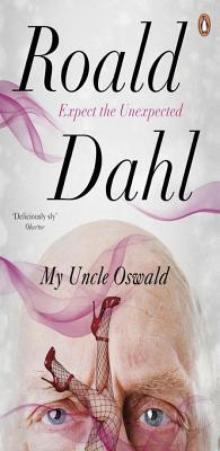 My Uncle Oswald
My Uncle Oswald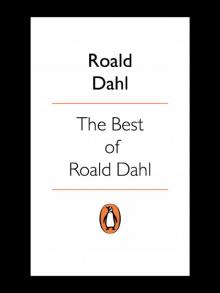 The Best of Roald Dahl
The Best of Roald Dahl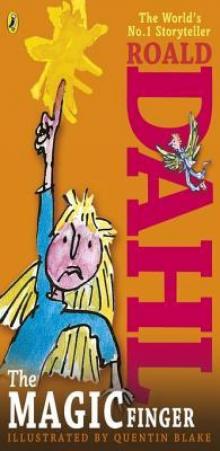 The Magic Finger
The Magic Finger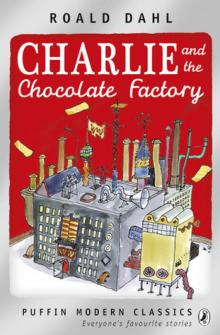 Charlie and the Chocolate Factory
Charlie and the Chocolate Factory Fantastic Mr Fox
Fantastic Mr Fox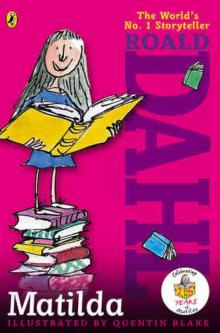 Matilda
Matilda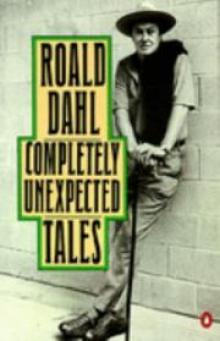 Completely Unexpected Tales: Tales of the Unexpected. More Tales of the Unexpected
Completely Unexpected Tales: Tales of the Unexpected. More Tales of the Unexpected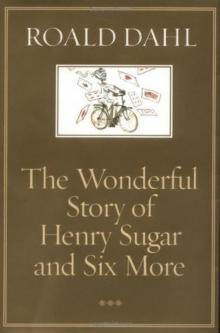 The Wonderful Story of Henry Sugar and Six More
The Wonderful Story of Henry Sugar and Six More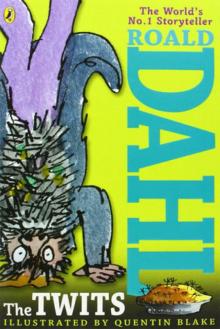 The Twits
The Twits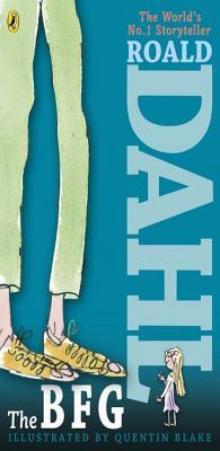 The BFG
The BFG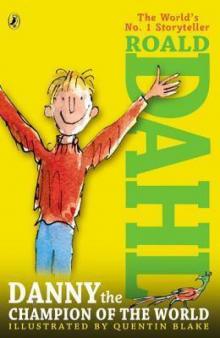 Danny the Champion of the World
Danny the Champion of the World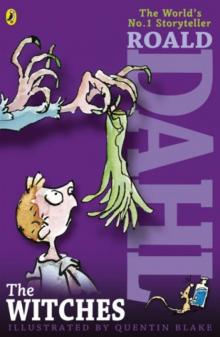 The Witches
The Witches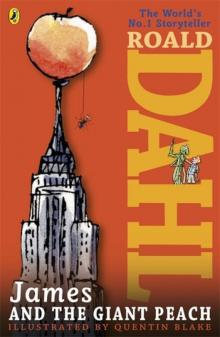 James and the Giant Peach
James and the Giant Peach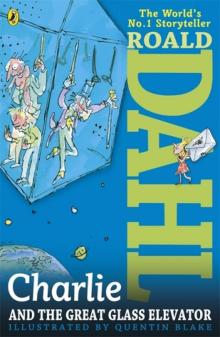 Charlie and the Great Glass Elevator
Charlie and the Great Glass Elevator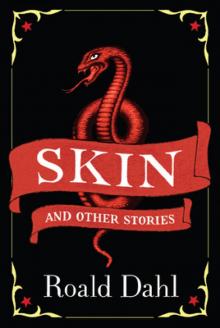 Skin and Other Stories
Skin and Other Stories Kiss Kiss
Kiss Kiss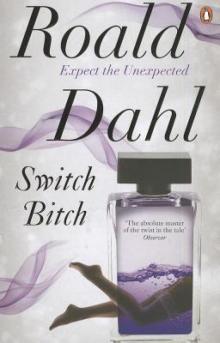 Switch Bitch
Switch Bitch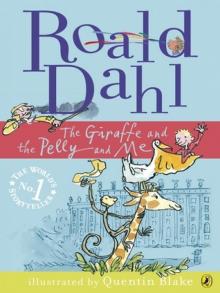 The Giraffe and the Pelly and Me
The Giraffe and the Pelly and Me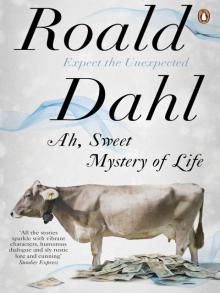 Ah, Sweet Mystery of Life
Ah, Sweet Mystery of Life Fear
Fear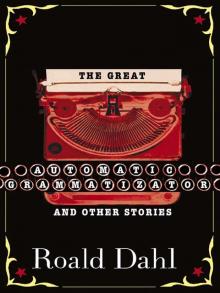 The Great Automatic Grammatizator and Other Stories
The Great Automatic Grammatizator and Other Stories Someone Like You
Someone Like You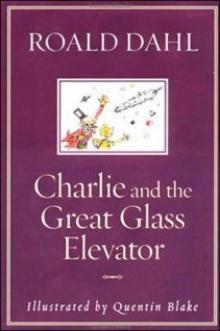 Charlie and the Great Glass Elevator c-2
Charlie and the Great Glass Elevator c-2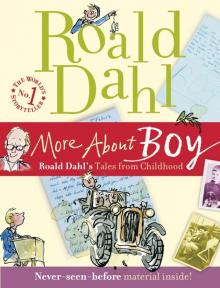 More About Boy
More About Boy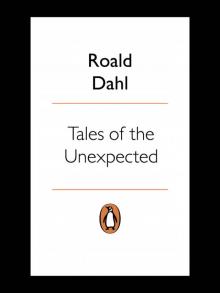 Tales of the Unexpected
Tales of the Unexpected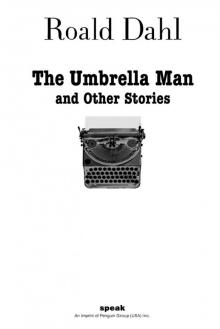 The Umbrella Man and Other Stories
The Umbrella Man and Other Stories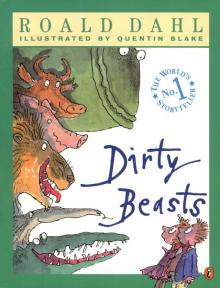 Dirty Beasts
Dirty Beasts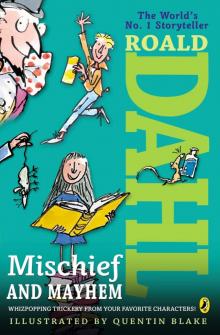 Roald Dahl's Mischief and Mayhem
Roald Dahl's Mischief and Mayhem The Collected Short Stories of Roald Dahl, Volume 1
The Collected Short Stories of Roald Dahl, Volume 1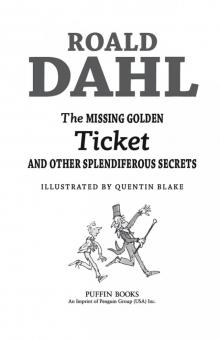 The Missing Golden Ticket and Other Splendiferous Secrets
The Missing Golden Ticket and Other Splendiferous Secrets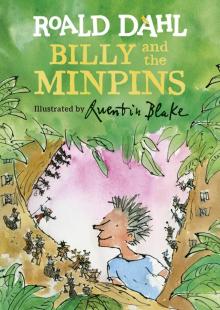 Billy and the Minpins
Billy and the Minpins Over to You
Over to You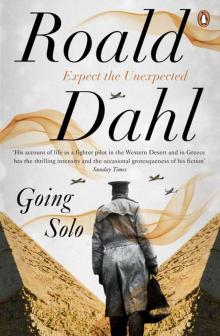 Going Solo
Going Solo Deception
Deception War
War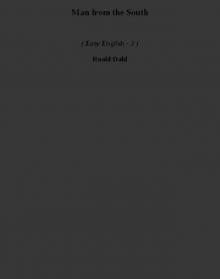 Man from the South ee-3
Man from the South ee-3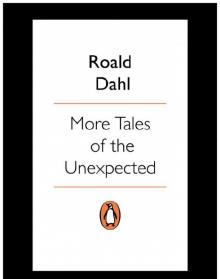 More Tales of the Unexpected
More Tales of the Unexpected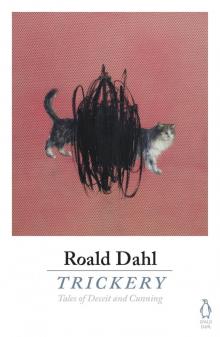 Trickery
Trickery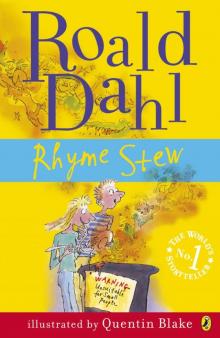 Rhyme Stew
Rhyme Stew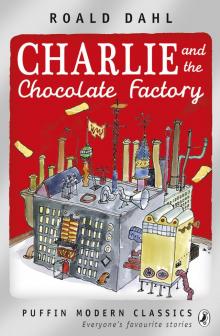 Charlie and the Chocolate Factory (Puffin Modern Classics relaunch)
Charlie and the Chocolate Factory (Puffin Modern Classics relaunch)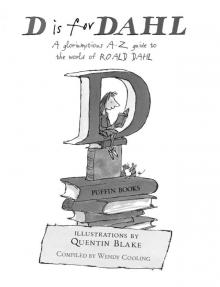 D is for Dahl
D is for Dahl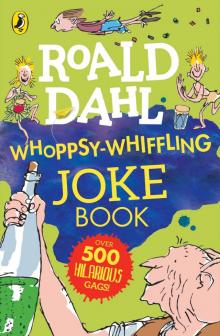 Roald Dahl Whoppsy-Whiffling Joke Book
Roald Dahl Whoppsy-Whiffling Joke Book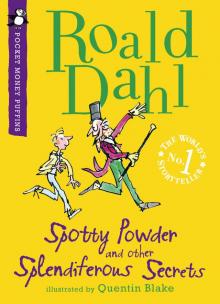 Spotty Powder and other Splendiferous Secrets
Spotty Powder and other Splendiferous Secrets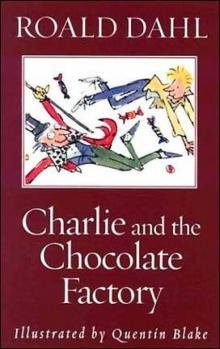 Charlie and the Chocolate Factory c-1
Charlie and the Chocolate Factory c-1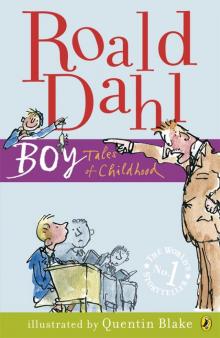 Boy
Boy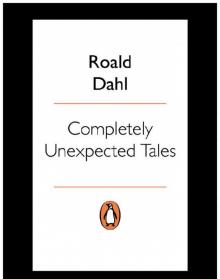 Completely Unexpected Tales
Completely Unexpected Tales Madness
Madness Innocence
Innocence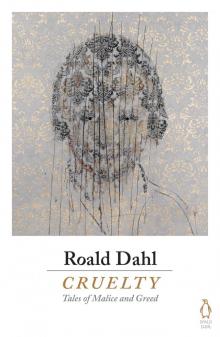 Cruelty
Cruelty George's Marvellous Medicine
George's Marvellous Medicine